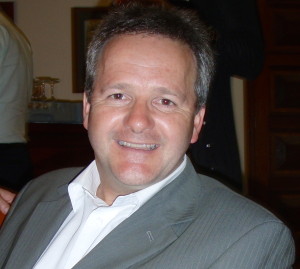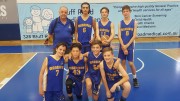When I first did my research on Ormond Amateur Football Club (OAFC) and its president, Richard Simon, I could swear both his name and face were familiar. It wasn’t until I meet him for our interview that the penny dropped. Richard was the father of one of my former basketball players, Will Simon.
In fact, a number of pennies dropped, as I knew plenty my former junior basketballers that I coached had also played at Ormond Junior football club, which despite sharing the same ground, the same colours and the same club song is a separate club to the OAFC. I knew those boys as solid young citizens from strong stable families, I was pretty confident that the OAFC would also be a club of strong values.
Richard started with the junior club through as most people do, through his three boys first starting Ozkick with the junior club and then progressing into junior teams at the Ormond Junior Club. As the years went on Richards three boys progressed from the junior ranks into the open age ranks at OAFC with a proud father watching on as all three boys represented the club together.
It was only a matter of time before Richard became more involved and joined the club’s committee. Twelve months later Richard became President not because the club was desperate for somebody to fill the role, but because Richard was keen to do the job and put his hand up for the role, which anybody at a non-profit club would attest to is quite rare.
Usually, most President’s draw the short straw to fill the job, however, Richard having three sons and a successful sports consultancy business behind him was actually keen to take on the job and he put his hand up with some enthusiasm five years ago and has been in the role ever since. As Richard owns and runs his own business he was and is in the unique position to manage his time to be effective and available for the role. So a lot of boxes were ticked for him to be the ideal candidate for such a role at a voluntary sporting club.
Richard has enjoyed the role and the club has enjoyed some success. We took this opportunity to ask him about his club
BM: What’s your favourite thing about the club?
RS: Its community aspect, I have always been involved in the community, such as my role n the formation of the Bendigo community bank in Ormond 8 years ago.
My biggest thrill was a senior Grand Final three years ago. Unfortunately, the boys lost against Kew, however, it gave the club and I great satisfaction that day, as out of the 22 players to take the field that day 19 had progressed from the junior clubs ranks, reinforcing a pathway that we have been keen to develop and promote. To me, this is very much what a community club is all about.
This wasn’t always been the way, Ormond used to be a powerhouse in the VAFA, winning multiple A grade premierships. From my point of view trying to maintain a playing list keep playing to those standards would ultimately mean local kids may not break through into the clubs senior ranks, therefore I am as content to play a lower grade if that ensures local players will continue to progress through from the junior pathway into our senior teams.
Clubs winning a premiership in a lower grade get the same thrill and sense of achievement as an A grade club does, and that is only magnified if they can accomplish that feat with the mates they have grown up with and played with throughout their junior and open age years at the club.
BM: Hard to argue against. Lifelong bonds and friendships are formed. How was this different to the years the club won the A grade flags?
RS: There was a strong core group that attracted similarly strong players. That has dissipated since, but also the higher competitions have improved significantly.
Over time District clubs have tended to fade away from those higher divisions in the VAFA where the old boys club of the various private schools tends to congregate. They have a significant advantage, as year upon year, they have their best student-athletes feed those clubs playing lists through their Alumni affiliates.
Note: While there are notable exceptions a close inspection of the composition of those VAFA sections bears out Richard’s point.
Richard continues “While it is allowable for amateur clubs to recruit players via finding them work, the other factor that can hurt district amateur clubs is other clubs in their immediate area who have no qualms in paying players. We have lost players from our ranks for this very reason, half a dozen in the past twelve months. The beauty of an Amateur club is that everybody is equal and you don’t have to manage the personalities where a paid player isn’t performing up to expectations and causing angst amongst those not getting paid or being paid less. I am pretty happy to not have those headaches.
BM: What is the thing that the club has the most success at
RS: That’s a good question, I would consider the pathway that has been established between the Ormond Junior and the OAFC is their most successful achievement for us as a club, we are a good community club that supports local groups who return that support to the club.
Note: Just listening to Richard you get a real sense of community and a family club where everybody pulls together to be competitive and achieve the best results that they are capable of. I nearly wanted to pull the boots on again.
BM: Do you lay claim to being a family club?
RS: Yes for sure.
BM: As a club do you have core beliefs to mentor the young men and women under your stewardship?
RS: Yes, the playing group have a planning session at the start of each season, where they create their core values. Also as a committee, the club has the mission statement “players, volunteers, supporters – Ormond Together” which form the pillars of the club and what it is about.
The players themselves have respect, family and enjoyment as their pillars as a playing group.
At the same time, we are not immune from players going off the rails a little bit. One of the areas the club could be better at, is our response to some of those areas where players can hit a wall in their behaviour and in some instances the club could be harder, but at the same time we need to balance on encroaching too hard, as it can lead to players leaving the club and others doing likewise in sympathy. So it always needs to be a balancing act.
BM: As a club have social policies such as a drug and alcohol policy?
RS: Yes the club has social policies with a zero tolerance on drugs manages alcohol consumption responsibly.
BM: With the emergence of the #metoo movement at the same time as women’s football, do you forsee any management issues this regard for your club?
RS: Yes I do, the club will need to have policies and guidelines to address this bit at the same time I am really happy with how the women’s and men’s team have interacted at the club and on game days, so I am confident we will manage this well. My biggest regret is that were not able to maintain the women’s team this season, but with four girl teams in the junior club’s ranks, I am extremely confident that the women’s team will be returning in the near future.
BM: What is the clubs greatest strength?
RS: The club’s brand and reputation within the community is our greatest strength. It is well known in the community and has great relationships with the Ormond Junior football club and the Ormond cricket club. Many people are involved in all three clubs and EE Gunn reserve is a hub for community activity and involvement. One of the things I am extremely proud of is the fact that we have four of our U19 players coaching back in the junior ranks.
Also, an important part of our brand is the respect other clubs have for Ormond from their past history of success and their current brand of competitive physical but fair football.
BM: What is the clubs greatest weakness?
RS: While not sure if it’s weakness one of the clubs greatest challenges is maintaining the involvement of the older junior kids as there are so many that give the sport away going into the older age groups and the senior club never realises their talents. These are for a number of reasons that range from the attraction of overseas travel to players losing motivation after participating at an AFL affiliated club such as the Sandringham Dragons and not realising their personal hopes and becoming disenchanted with the sport and not returning to the club.
Note: I think this a problem confronting a number of sports in this modern era of closer communication and more accessible travel.
Richard continues, “Ormond has a rich history of players going on to play at VFL/AFL level with the most recent being Max Gawn, Jack Frost and most recently Jack Higgins who debuted last weekend at Richmond. The most well know Old boy at the moment is Steve Smith the former Melbourne defender who is now chairman of the MCC.”
 BM: Do they come back to the club for functions etc?
BM: Do they come back to the club for functions etc?
RS: Yes, the club regularly holds functions where these old boys come back to maintain their connection.
BM: How is your relationship with the Council?
RS: We actually have a good working relationship with the council and we consider them as our biggest sponsor and partner. The club is working with them on a number of projects from a scoreboard to an assessment of the club’s pavilion, especially with the advent of women’s football and the need for change rooms that reflect that.
BM: What about our State and Federal MP’s?
RS: Upper house MP David Southwick is a sponsor of the club and a regular attendee of the club’s luncheons. David has also been of great assistance when the railway works with the Ormond overpass were happening and the club lost the use of its bottom oval for two years.
BM: What has been the highlight of your Presidency?
RS: The highlight was witnessing my three boys and their friends progressing from playing juniors together to representing the senior club together. Also, the reserves going through last season undefeated and winning the reserves premiership was another highlight, especially as the reserves also won the premiership in 2015.
The senior squad has also enjoyed success but without quite winning a premiership, last season losing in the preliminary final. They have been consistent finalists and started the season with a strong win last weekend.
BM: What has been the lowlight?
RS: The lowlight was losing the women’s team this year, as there had been an enormous amount of work to form the inaugural squad, though Richard is hopeful of remedying this situation in the not too distant future.
BM: What has been the frustration?
RS: The competition for players with other clubs establishing relationships with schools that formerly feed players into Ormond, but no longer do so.
BM: What is the biggest challenge facing the club?
RS: Like most clubs is the recruitment of volunteers, with this year being the worst we have faced having lost a number of volunteers and then struggled to replace them. This means that we have fewer doing more.
BM: What would be your elevator speech to potential volunteers or sponsors?
RS: Why not consider supporting a genuine family based, community orientated club. A club that gives local kids an opportunity to progress from juniors to play senior football with the club.
BM: What are the club’s long-term goals?
RS: We would love for the club to be a strong C grade club that challenges for a B grade spot, but currently we are a division below that. I think the senior team has a chance for another strong season to begin that journey to the club’s preferred grade. All the club’s four teams enjoyed strong wins in the opening round, so the club is enjoying great depth at the moment.
We also want to re-establish the Women’s team and become a five-team club once more with Seniors, Reserves, Thirds, U19’s and Women’s all wearing the brown and blue and to refurbish the change rooms at the club and to grow great off-field support for the club.
On the field, the club has always been strong in terms of numbers and performance but off-field the club has struggled to keep a core group of about twenty volunteers. That’s also something we would like to address.
BM: How much longer for you in the top job?
RS: I originally committed for five years, but would be happy that if somebody else wanted the job to step aside.
BM: That would also require somebody else to put their hand up. So you probably will be in the job for twenty years, maybe like Eddie McGuire?
RS: Probably time for Eddie to step aside!
BM: Any finals thoughts for the interview about the OAFC?
RS: Ormond is the REAL DEAL and has something for everybody both on and off the field and hopefully the Monders can realise some premiership success a the end of the season.
As we conclude the interview my suspicion is that the Ormond Amateur Football Club is an extremely lucky organisation to have somebody of Richard’s talents in the top job and he could be there for some time yet. My sense is he would happily continue to serve.
As I left the clubrooms, I bumped into BJ Hardwick, Damien’s son, a former basketballer who I had the good fortune to coach and now a first player at Ormond. We caught up for a few minutes and as we chatted I could see a large group of enthusiastic young men proudly in their colours preparing for training. They certainly reflected what their President had been telling me about their club. I also have had the good fortune to coach a number of his charges like BJ through my time in basketball, they are now fine young men and I leave the interview confident they will acquit themselves well both on and off the field.
The old saying goes that “the snake rots from the head”. There is little chance of that happening here, the Ormond Amateur Football Club is in good hands
GO MONDERS!







Be the first to comment on "OAFC President, Richard Simon, building a community club!"